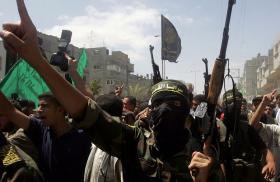A federal appeals court in Chicago today upheld a $156 million judgment against several Palestinian charities accused of funding Hamas. A full history of the Boim case, covered extensively on this blog, is available here.
In an earlier appeal, the original judgment against the defendants was overruled based on the Seventh Circuit's disturbing finding -- now reversed -- that "plaintiffs must be able to produce some evidence permitting a jury to find that the activities of HLF, Salah, and AMS contributed to the fatal attack on David Boim and were therefore a cause in fact of his death."
This latest opinion (87-page Acrobat file) found that "Anyone who knowingly contributes to the nonviolent wing of an organization that he knows to engage in terrorism is knowingly contributing to the organization's terrorist activities."
In the case of Hamas, the U.S. Court of Appeals for the Seventh Circuit ruled, "A knowing donor to Hamas -- that is, a donor who knew the aims and activities of the organization -- would know that Hamas was gunning for Israelis."
The court offered the following hypothetical to explain its argument:
Consider an organization solely involved in committing terrorist acts and a hundred people all of whom know the character of the organization and each of whom contributes $1,000 to it, for a total of $100,000. The organization has additional resources from other, unknown contributors of $200,000 and it uses its total resources of $300,000 to recruit, train, equip, and deploy terrorists who commit a variety of terrorist acts one of which kills an American citizen . . . The fact that the death could not be traced to any of the contributors . . . and that some of them may have been ignorant of the mission of the organization (and therefore not liable under a statute requiring proof of intentional or reckless misconduct) would be irrelevant. The knowing contributors as a whole would have significantly enhanced the risk of terrorist acts and thus the probability that the plaintiff's decedent would be a victim, and this would be true even if Hamas had incurred a cost of more than $1,000 to kill the American, so that no defendant's contribution was a sufficient condition of his death.
But what if a person specifically earmarked donations not for terrorist but humanitarian activity carried out by a terrorist group like Hamas? The court addressed this too:
This case is only a little more difficult because Hamas is (and was at the time of David Boim's death) engaged not only in terrorism but also in providing health, educational, and other social welfare services. The defendants other than Salah directed their support exclusively to those services. But if you give money to an organization that you know to be engaged in terrorism, the fact that you earmark it for the organization's nonterrorist activities does not get you off the liability hook. . . . The reasons are twofold. The first is the fungibility of money. If Hamas budgets $2 million for terrorism and $2 million for social services and receives a donation of $100,000 for those services, there is nothing to prevent its using that money for them while at the same time taking $100,000 out of its social services "account" and depositing it in its terrorism "account." . . . Second, Hamas's social welfare activities reinforce its terrorist activities both directly by providing economic assistance to the families of killed, wounded, and captured Hamas fighters and making it more costly for them to defect (they would lose the material benefits that Hamas provides them), and indirectly by enhancing Hamas's popularity among the Palestinian population and providing funds for indoctrinating schoolchildren.
These facts were among the issues I discussed in my testimony as an expert witness in the original Boim hearing.
In short, as the court found in today's ruling, "Anyone who knowingly contributes to the nonviolent wing of an organization that he knows to engage in terrorism is knowingly contributing to the organization's terrorist activities."
The court dropped one defendant, Muhammad Salah, finding that for liability to attach, material support must be given prior to the victim's injury. Salah was in jail for the entire period between the passage of the law and David Boim's death, so the court determined he could not be liable. It also called for a rehearing of the culpability of the Holy Land Foundation (HLF) in the case on technical legal grounds
Coming on the heels of the "guilty on all counts" verdict in the HLF criminal trial last week, the Boim ruling is not just another landmark counterterrorism ruling but one more in a series of financial setbacks for Hamas.
Matthew Levitt is director of the Stein Program on Counterterrorism and Intelligence at The Washington Institute. He is the author, with Michael Jacobson, of The Money Trail: Finding, Following and Freezing Terrorist Finances (2008).
Counterterrorism Blog


